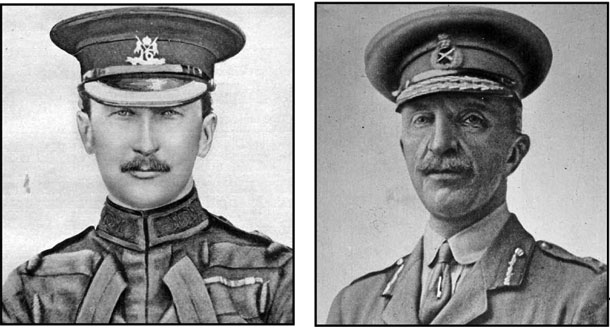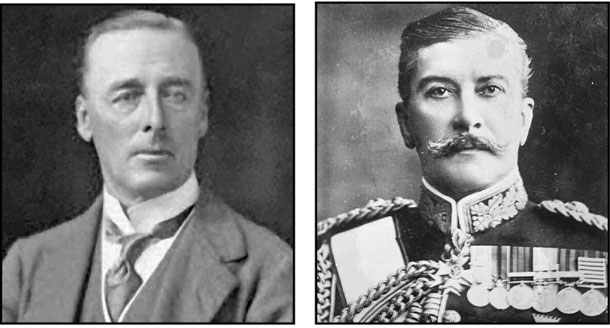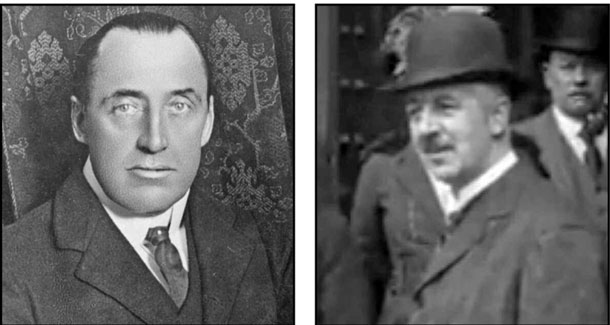2 March 2014 Edition
Centenary of the Curragh Mutiny
Remembering the Past

• Brigadier General Hubert Gough and Director of Military Operations Henry Wilson
The leading mutineer, Brigadier General Hubert Gough, travelled to London where he was welcomed by Sir Henry Wilson
IN THEIR opposition to Home Rule for Ireland during the crisis of 1912 to 1914, the unionists were backed by a large section of the British Establishment, including many senior British Army officers.
When the Ulster Volunteer Force was formed in early 1913, the Tories in Britain helped to officer, arm and train them and their first commander was retired British Army General Sir George Richardson, Knight Commander of the Order of the Bath, Companion of the Order of the Star of India, Companion of the Order of the Indian Empire.
The deeply reactionary nature of the Tory/unionist alliance was expressed by Lord Willoughby de Broke who said that “every white man in the British Empire” would be supporting Orange resistance. With the UVF in place, the unionists began to demand the “exclusion of Ulster” from the Home Rule Bill. At first, the British Liberal Government of Herbert Asquith and the Irish Party of John Redmond opposed this, but the Liberals were soon climbing down in the face of Tory/unionist rebellion. Asquith said there would have to be another Westminster election before Home Rule became law and during 1913 and early 1914 he and Redmond gradually crumbled under the pressure to the point where they agreed in principle to “exclusion”, thus paving the way for the partition of Ireland.
While force was being used by the British Government against Dublin workers during the 1913 Lockout, the armed unionists and Tories who threatened civil war went untouched by the Royal Irish Constabulary or the British Army. It was only in December 1913, after the formation of the Irish Citizen Army and the Irish Volunteers, that the importation of arms into Ireland was banned.

• The Liberal Party’s Jack Seely and British Army General Arthur Paget
The Tories/unionists threatened that if the British Army were used to ‘coerce Ulster’ there would be mutiny.
“If Mr Asquith did employ the British Army, he would break the back of the army and any man would be justified in shooting Mr Asquith in the streets of London,” warned Tory MP Lieutenant-Colonel Pretyman Newman.
On 9 March 1914, the Home Rule Bill had its second reading for its last session in the House of Commons. Asquith proposed a “county option with a time limit” by which any Ulster county might vote itself out of Home Rule for a period of six years. Edward Carson retorted: “We do not want sentence of death with a stay of execution for six years.”
As the debate continued at Westminster, troops were to be moved to various points and the Royal Navy was to support with warships sailing over from Scotland. The operation was to take place on 21 March.
Sir Henry Wilson, Director of Military Operations at the War Office in London – a man who had helped establish the UVF – told Carson what was about to happen.

• Unionist leader Edward Carson and Tory MP Pretyman Newman
On 19 March, Carson stormed out of the House of Commons and came back to Craigavon, estate of unionist leader James Craig and headquarters of the “Provisional Government of Ulster”. The UVF had been ordered to “wipe out” the police if they tried to arrest Carson.
The British Army Commander-in-Chief in Ireland, General Sir Arthur Paget, called a conference of senior officers whom he told of the orders he had received from “those swines of politicians”. He told the War Office he would not move troops. Liberal Party Secretary of State for War Jack Seely tried to negotiate with Paget, who was supposedly under his command, but on 20 March he received a telegram from Paget stating that the 57 officers at the Curragh Camp in County Kildare who would “prefer to accept dismissal if ordered North”.
It was mutiny.
Seely backed down. The leading mutineer, Brigadier General Hubert Gough , travelled to London, where he was welcomed by Wilson and assured that troops would not be used to meet armed opposition to Home Rule in the North. The mutinous British Army officers were reinstated and in the end it was Seely who resigned.
The Tory Morning Post newspaper summed it up with the headline: “The Army has killed the Home Rule Bill.”
Commenting on the mutiny, James Connolly wrote:
“Suppose mere privates on being ordered to march against strikers had refused, what would befall them? Imagination fails to picture the columns of the Tory, Liberal, and Home Rule press during the ensuing week. But of one thing we may be assured, viz that any one of such privates so refusing who was out of prison inside of 12 months would be a lucky man.”
Irish republican Roger Casement said that the mutiny had shown that “the real Government of Ireland, on the unionist principle, is in the Curragh Camp”.
• The Curragh Mutiny by senior British Army officers was a serious blow against the prospect of Home Rule for Ireland and took place in March 1914, 100 years ago this month.




